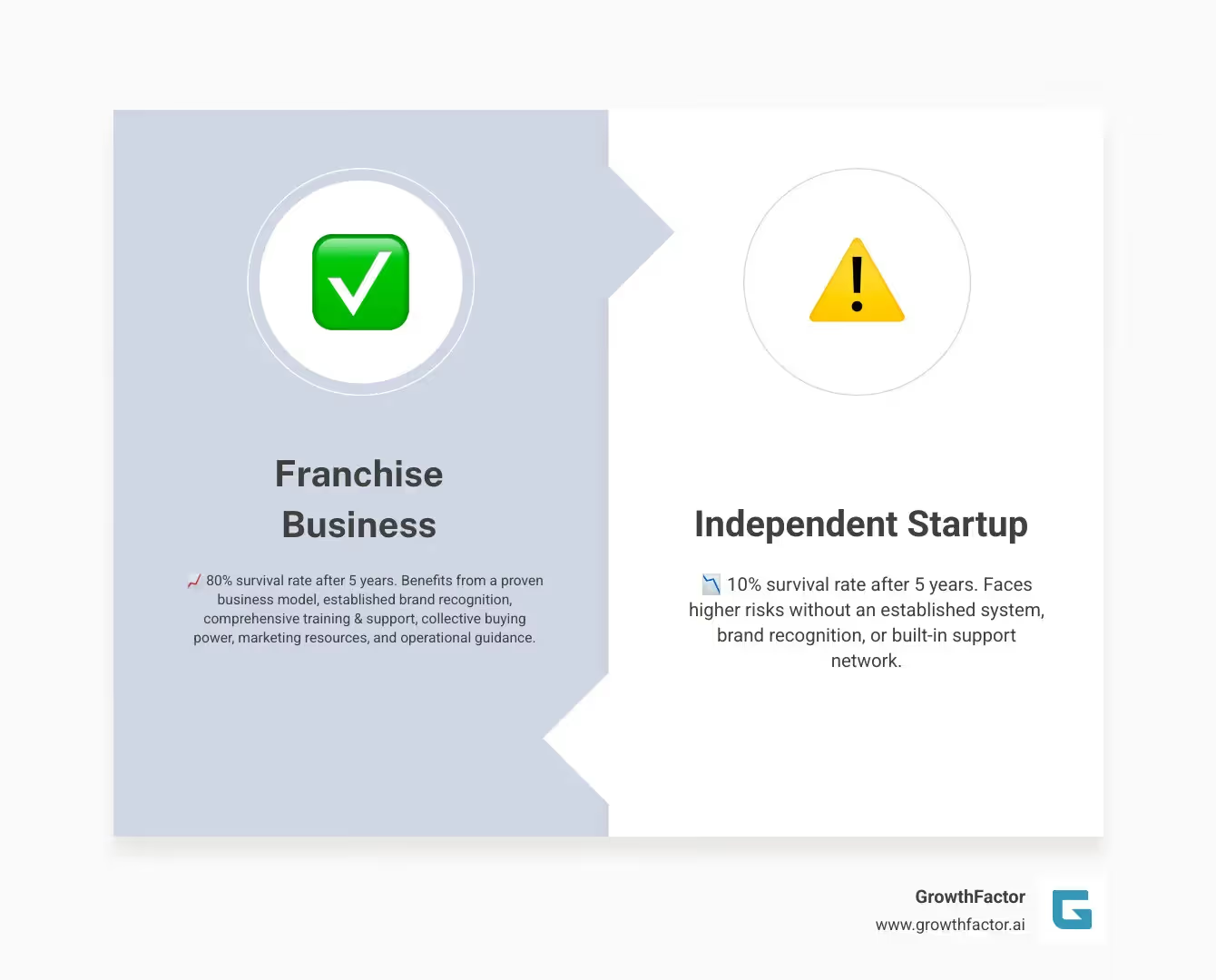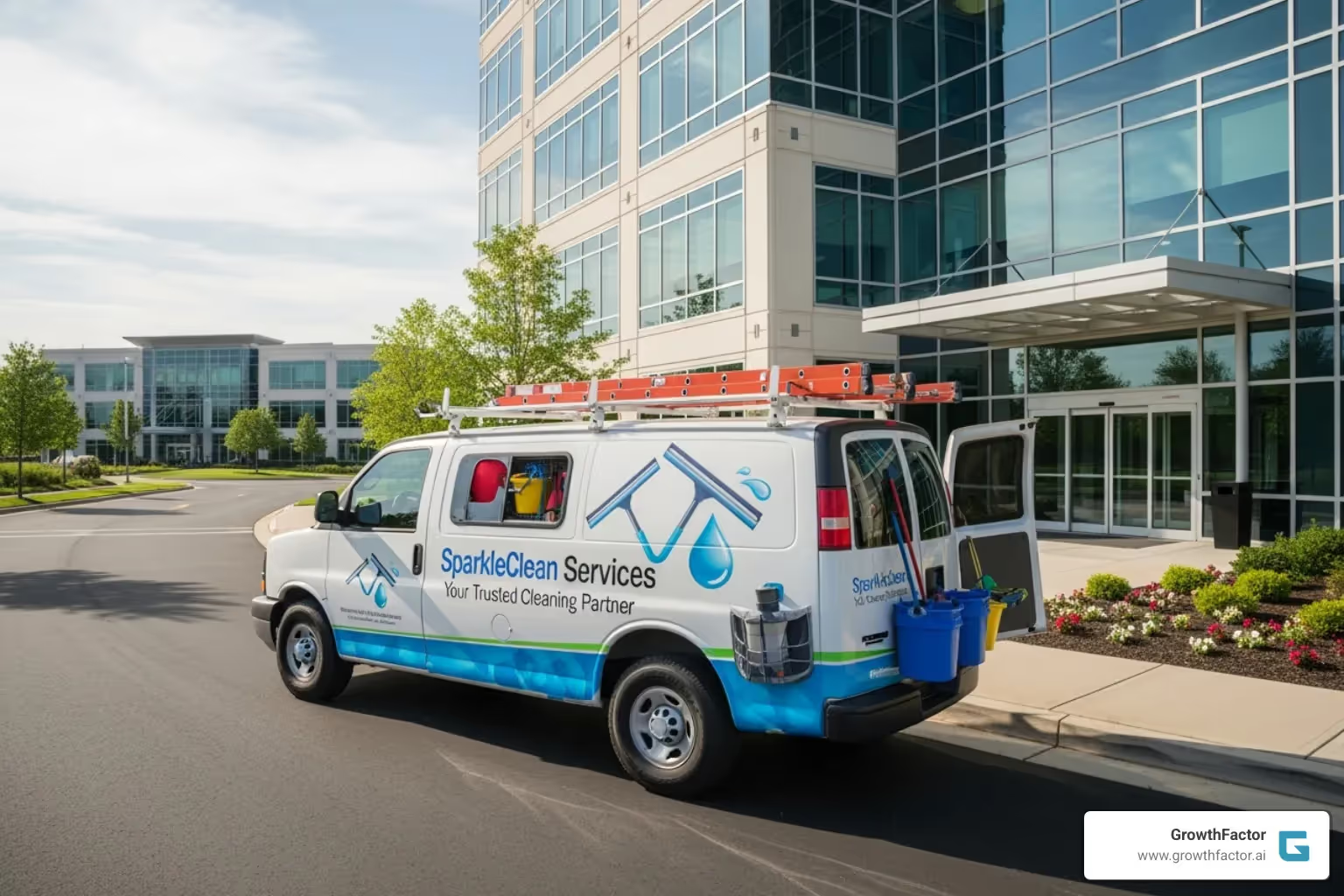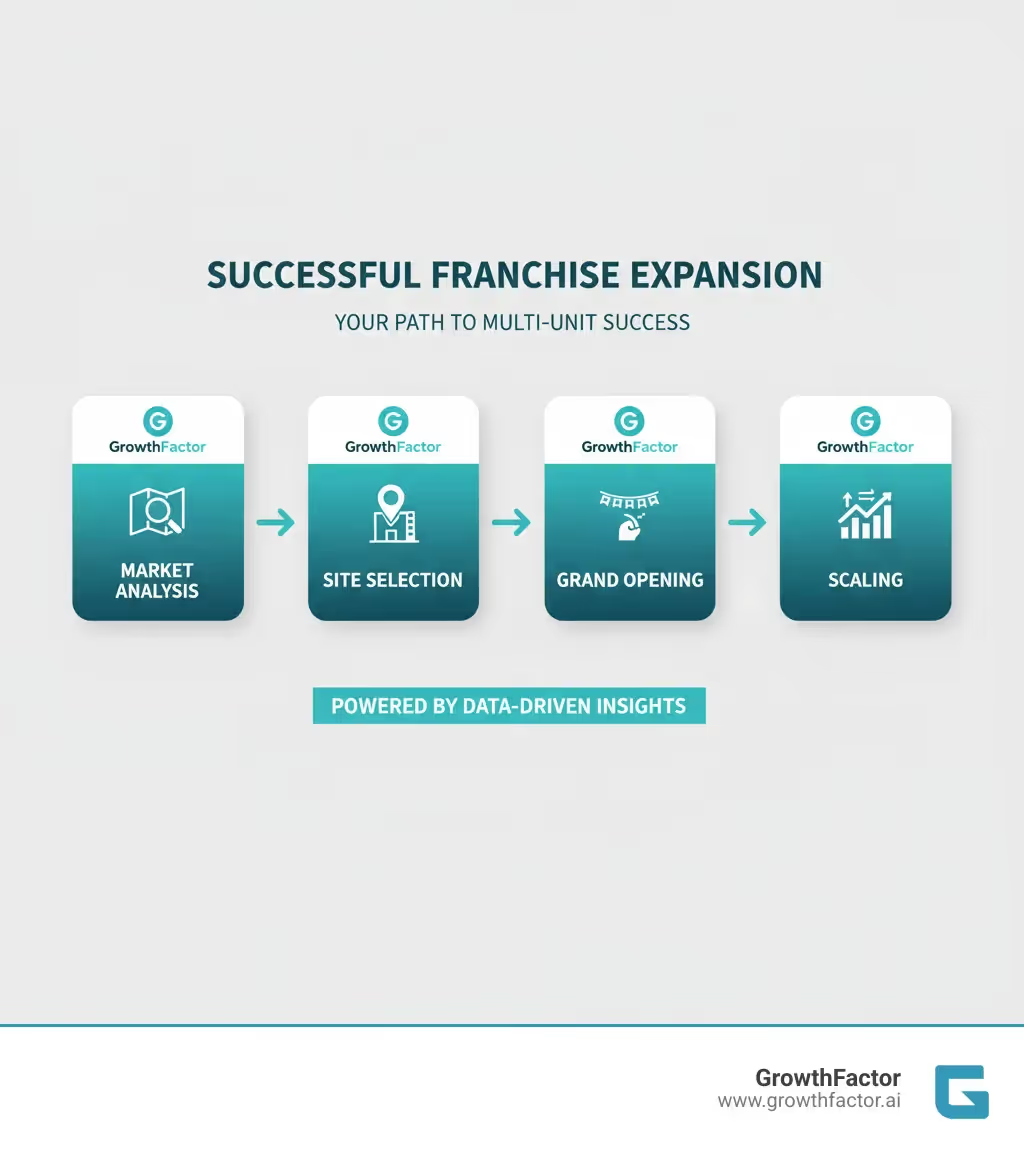10 Franchises Under $50K: A Due Diligence Guide for 2026
Written by: Clyde Christian Anderson
Why a Low-Cost Franchise Might Be Your Best First Business

Affordable franchise opportunities are not a myth—they're a proven path to business ownership that doesn't require a six-figure investment. Here are top options under $50K:
FranchiseInitial InvestmentBest ForCruise Planners$695 - $23,367Home-based travel enthusiastsDream Vacations$1,795 - $21,000Part-time entrepreneursAnago Cleaning$1,000 - $21,000Service-oriented business ownersTown Money Saver$8,200 - $19,500Marketing professionalsImage One~$15,000Those wanting turnkey operations
While McDonald's and Dunkin' dominate headlines, many of the 700,000+ franchise owners in the U.S. got started with less than $50K.
The franchise industry generates over $2.1 trillion annually. According to the International Franchise Association, franchises generally show stronger survival rates than independent startups, though results vary significantly by brand, industry, and location. You're not just buying a business; you're buying a proven system with training, support, and an established brand—but success still depends on your execution and market selection.
Low-cost franchises exist across multiple industries. Travel, commercial cleaning, tutoring, and business services all offer entry points under $50K. Many are home-based, eliminating expensive overhead. Some require minimal employees or can start part-time.
Success isn't guaranteed. You'll still need to work hard, follow the system, and make smart decisions—especially about location and market selection.
I'm Clyde Christian Anderson, founder of GrowthFactor.ai. Over the past decade, I've helped franchise brands and multi-unit retailers evaluate thousands of potential territories. The pattern is clear: franchisees who understand their local market before signing outperform those who don't. When evaluating low-cost franchise options, the right territory can make or break your investment, which is why data-driven site selection is critical for new franchisees looking to maximize their return.

The Smart Investor's Playbook: Due Diligence Before You Buy
With budget-friendly franchise options, a low price tag doesn't mean you can skip your homework. Smart due diligence is even more critical when investing less capital upfront. You're not just buying a business; you're choosing a long-term partner.
Your first stop is the Franchise Disclosure Document (FDD). By law, franchisors must provide this document at least 14 days before you sign or pay. The FDD contains 23 items covering everything from the company's litigation history to your ongoing obligations. This document is your protection and reveals what you're really getting into.
The most important section is Item 19: Financial Performance Representations. This is where franchisors can share revenue and profitability data from existing locations. Not all franchisors include it, but when they do, it's gold. You'll see real numbers—average sales, profit margins, and performance variations. Remember: these are historical figures, not guarantees.
Next, talk to actual franchisees. The FDD includes a list of current and former owners. Contact them and ask about franchisor support, hidden costs, profitability, and if they'd do it again. These conversations are more valuable than any marketing brochure.
Don't go it alone on the legal and financial side. Hiring a franchise attorney and financial advisor is money well spent. A franchise agreement is a binding legal contract, often for 10 years or more. An experienced lawyer can spot problematic clauses, while a financial advisor helps you understand if the numbers truly work.
Before you dive in, assess your business goals and risk tolerance. Are you seeking a full-time empire or a part-time income? Do you need the security of an established brand or are you comfortable with a newer concept? Understanding yourself first prevents choosing a franchise that doesn't fit your life.
Also, know the difference between a franchise and a business opportunity. A franchise provides an established brand, ongoing support, and a proven system. A business opportunity is often a one-time training program, leaving you on your own. Business opportunities cost less and offer more flexibility but lack the safety net of continuous franchisor support. The FTC offers helpful tips on spotting a potential fraud in this space.
Even with a home-based franchise, location still matters. You'll serve a specific geographic territory, and understanding that market is crucial. Who are your customers? What's the competition? Is there demand? For franchises needing a physical location, the right spot is paramount.
Due diligence is the most important part of the process. Take your time, ask hard questions, and read everything. The right opportunity, thoroughly vetted, can change your life.
Top 10 Low-Cost Franchise Opportunities Under $50K
Now that you understand due diligence, let's explore the opportunities. These franchises prove you don't need a fortune to start your business. Each option requires less than $50,000 and they span industries from travel to commercial services.
What makes these franchises stand out is their ability to deliver value without massive overhead. Many are home-based, don't require large teams, and can start as side hustles.
1. Cruise Planners: Travel From Home

Cruise Planners is a home-based travel agency franchise where you sell full-service vacation packages, from cruises to land trips. No storefront is needed, so you can focus on helping people create unforgettable experiences.
Your initial investment ranges from $695 to $23,367, with a franchise fee around $10,995 (often discounted). Royalties are a reasonable 1.5% to 3% of gross commissionable fares. Veterans receive additional discounts.
The luxury travel industry is projected to reach $3,064 billion by 2032, offering serious market momentum. Cruise Planners provides comprehensive training, ongoing support, and established supplier relationships.
2. Dream Vacations: Part-Time Friendly
Dream Vacations has a similar model, with over 1,200 franchisees specializing in land and cruise vacations since 1991. Its structure is part-time friendly, allowing you to keep your day job while building the business.
Your initial investment is $1,795 to $21,000, with a franchise fee around $9,800. Royalties are 1.5% to 3% of annual commissionable sales. You'll receive six days of training and ongoing marketing support to start booking trips quickly.
3. Commercial Cleaning (Anago/Vanguard): Recession-Resistant

The $106.7 billion janitorial services industry is always growing. Commercial cleaning franchises like Anago Cleaning Systems and Vanguard Cleaning Systems offer a stable and scalable business model. Offices and commercial spaces always need cleaning.
Anago's initial investment starts at $1,000 to $21,000, with franchise fees from $400 and royalties around 5%. Vanguard requires $5,500 to $37,100, with 11.5% royalties. Both provide extensive training.
Many of these franchises provide guaranteed client contracts at the start, ensuring immediate cash flow. The B2B model often leads to larger contracts and predictable income.
4. Club Z! In-Home Tutoring: Education Investment
Club Z! In-Home Tutoring is one of the largest one-on-one tutoring companies in America. This franchise serves all ages and subjects and is managed from a home office. You build a network of qualified tutors and match them with students.
The initial investment is $40,975 to $57,425, with a franchise fee between $27,250 and $39,750. Royalties are 6% to 8%. You get a proprietary curriculum, extensive training, and marketing support to connect with families in your community. Parents consistently invest in their children's education.
5. Proforma: B2B Marketing Services
Proforma is a B2B franchise providing printing, promotional products, and digital marketing solutions. This home-based model requires no inventory, eliminating a major expense.
Your initial investment is $7,030 to $59,695, with franchise fees from $0 to $34,500. Royalties are 7% to 8% of gross volume. You gain access to Proforma's technology platform, supplier network, and support system.
You become a single point of contact for businesses' marketing needs, while Proforma handles backend logistics, production, and fulfillment.
6. Image One: Turnkey Commercial Cleaning

Image One offers a turnkey commercial cleaning model. One franchisee started for $15,000, which included equipment, training, and initial accounts, eventually projecting $1 million in revenue.
The initial investment is approximately $15,000, with 10% royalties on annual gross revenue. The package includes initial equipment, supplies, training, and—critically—billing and collections support. This administrative help lets you focus on service and growth.
7. Town Money Saver (TMS): Local Advertising
Town Money Saver is an advertising franchise connecting local businesses with consumers via direct mail. No storefront or employees are required. TMS corporate handles accounting, graphic design, printing, and mailing.
The initial investment is $8,200 to $19,500, with a $0 franchise fee, making it one of the most accessible options available. You buy into a proven system and focus on sales and relationship building.
8. Help-U-Sell Real Estate: Fee-Based Model
Help-U-Sell Real Estate uses a fee-for-service model instead of percentage-based commissions, charging sellers a flat fee. This can be more attractive to clients and mean lower overhead for you.
Your initial investment is approximately $15,000, with 6% royalties on gross commissions. You receive comprehensive training and marketing supplies. This model offers a competitive advantage for those with a real estate background.
Real estate is local, so location intelligence is vital. Understanding your customers, competition, and demand is essential for success in any territory.
9. Rhea Lana's: Children's Consignment Events
Rhea Lana's uses an event-based model for children's clothing consignment. Franchisees organize large, seasonal events, making this ideal for part-time operation with great flexibility.
The initial investment is approximately $15,000, with 1% to 3% royalties on gross sales. You get proprietary software and a proven event planning system. This model taps into sustainability and budget-conscious shopping without the overhead of a year-round store.
10. TSS Photography: Youth Sports Market
TSS Photography focuses on the recurring market of school and youth sports photos. This flexible, home-based operation suits those who enjoy photography and working with children. Franchising since 1984, the model is well-refined.
Your initial investment is approximately $10,500. Uniquely, TSS doesn't charge monthly royalties; instead, they profit from photo production costs. You receive photography training, sales guidance, and business development support. The work is predictable and seasonal.
These ten franchises offer accessible paths to business ownership that require work and smart execution but not a massive initial investment.
Beyond the Buy-In: Understanding Ongoing Costs and Profitability
The low price of budget-friendly franchises is exciting, but first-time buyers often don't realize the initial investment is just the beginning of the financial commitment.
Royalty fees are your biggest recurring expense. Most franchisors charge a percentage of your gross sales—typically 1.5% to 11.5% for the opportunities we've covered. This fee compensates the franchisor for the brand, systems, and ongoing support that give you an advantage over independent businesses.
Beyond royalties, many franchisors require contributions to an advertising fund for system-wide marketing. You may also face technology fees for proprietary software or IT support. Budget for supplies, equipment maintenance, insurance, and continuing education.
Evaluating actual profitability requires careful analysis. The FDD's Item 19, which provides financial performance representations, is your best tool. Not all franchisors provide this, but when they do, study it. Look beyond average revenue to understand profit margins, operating costs, and break-even timelines.
These are averages. Your results will depend on your market, operational efficiency, and marketing. A franchise in a dense suburb might dramatically outperform one in a rural area.
Scalability is where low-cost franchises can shine. Many service-based franchises offer clear paths to multi-unit ownership. Once you master your first territory, you can expand to additional units, multiplying your earning potential. Each expansion requires its own market entry strategy to ensure smart growth.
Even home-based businesses need strategic thinking about their service areas. Understanding your customers, competition, and demand is essential. The difference between a franchise that survives and one that thrives often comes down to fundamentals: a proven model, effective support, your operational excellence, and being in the right market.
Frequently Asked Questions about Low-Cost Franchises
If you're exploring affordable franchise options, you likely have questions. Here are answers to the most common concerns from aspiring franchise owners.
What industries have the most affordable franchises?
Service-based industries consistently offer the most affordable entry points into franchising because they don't require expensive storefronts, large inventories, or specialized equipment.
- Commercial cleaning franchises like Anago and Image One are perennial favorites.
- Travel agencies such as Cruise Planners and Dream Vacations can operate from a home office.
- Home services like lawn care or power washing can launch with a truck and tools.
- Tutoring services like Club Z! thrive without a physical location.
- Mobile businesses, including photography, consulting, and repair services, use a vehicle as an office.
- Advertising and marketing franchises like Town Money Saver leverage digital tools and direct mail.
For more options, Franchise Business Review maintains a list of Top Low-Cost Franchises for 2025.
Can you get financing for a low-cost franchise?
Yes. Banks often view franchises as safer investments than independent startups due to their proven models and franchisor support, which can work in your favor.
- SBA loans are the gold standard. The Small Business Administration guarantees a portion of commercial loans, making lenders more willing to approve them.
- Some franchisors offer in-house financing or have partnerships with third-party lenders.
- Veteran discounts are common, with many franchisors offering significant breaks on franchise fees.
- Home equity loans can provide capital, but carefully consider using personal assets as collateral.
- Retirement fund rollovers (ROBS) allow you to use your 401(k) without penalties, but this requires an experienced financial advisor.
Financing can cover the initial investment, working capital, and living expenses while you build the business.
What are the biggest risks with a budget-friendly franchise?
Lower-cost franchise options offer great value but come with challenges.
- Brand recognition is often limited. Unlike major brands, you'll need to work harder to establish credibility in your local market, making the franchisor's marketing support critical.
- Some low-cost options, especially business opportunities rather than true franchises, may offer limited ongoing support. Clarify the level of support during due diligence.
- Hidden costs can surprise unprepared franchisees. The initial investment doesn't include vehicle expenses, insurance, or working capital. A low entry cost doesn't guarantee cheap operating expenses.
- The biggest risk is skipping due diligence. A small investment doesn't mean low stakes. Failing to review the FDD, interview franchisees, or heed red flags increases your risk of failure.
- Watch out for overly restrictive territories that can limit your growth potential. Ensure your territory is clearly defined and large enough to support your goals.
Conclusion: Making an Informed Franchise Decision
Owning a business doesn't require a trust fund or a small fortune. With affordable franchise options, there's a path to entrepreneurship that fits your budget and lifestyle, whether it's a home-based travel agency or a commercial cleaning operation.
The franchise world is more accessible than ever. For under $50,000, you can access a proven business model with training and support. The franchisor provides the playbook, but your success depends on smart decisions, especially understanding your market and choosing the right territory.
Location intelligence is your competitive advantage. Even a home-based business serves a specific area, and understanding local demographics, competition, and demand separates successful franchisees from those who struggle.
The bottom line: do your homework. Read the FDD cover to cover. Talk to current and former franchisees. Hire a franchise attorney. Understand your market before you sign. The right opportunity, thoroughly vetted, can be the foundation of a successful business—but only if you approach it with realistic expectations and rigorous due diligence.
Related Resources:
- Data-Driven Site Selection: Why Territory Analysis Matters
- Market Entry Strategy for Multi-Unit Expansion
- Solutions for Franchise Development Directors

Citations
The human algorithm
Request Your demo
Schedule meeting
Or submit your information below and we'll be in touch to schedule.


